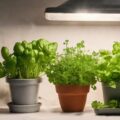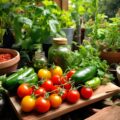Getting Started with Your First Vegetable Garden
Embarking on your first vegetable gardening adventure can feel both exciting and daunting. The good news is that growing your own food doesn’t have to be complicated. With the right selection of easy-to-grow vegetables, even complete beginners can experience the joy and satisfaction of harvesting their own homegrown produce. This guide will introduce you to some of the easiest vegetables for novice gardeners, helping you cultivate not just a thriving garden, but also a sense of connection to the earth and the food you eat.
Top 5 Vegetables for Beginner Gardeners
Let’s explore five vegetables that are known for their forgiving nature and relatively simple growing requirements:
- Lettuce: Quick-growing and versatile, lettuce is perfect for beginners. It can be grown in small spaces and harvested continuously.
- Radishes: These fast-growing root vegetables can be ready to harvest in as little as 3-4 weeks.
- Cherry Tomatoes: While all tomatoes are relatively easy to grow, cherry tomatoes are particularly beginner-friendly and prolific.
- Green Beans: Whether bush or pole varieties, green beans are low-maintenance and produce a bountiful harvest.
- Zucchini: Known for its abundance, zucchini is a rewarding choice for new gardeners.
Creating the Perfect Environment for Your Vegetables
Success in vegetable gardening often comes down to providing the right conditions. Here are some key factors to consider:
- Sunlight: Most vegetables need at least 6 hours of direct sunlight daily.
- Soil: Well-draining, nutrient-rich soil is crucial. Consider adding compost to improve soil quality.
- Water: Consistent moisture is important. Water deeply but less frequently to encourage strong root growth.
- Space: Give your plants enough room to grow. Follow spacing guidelines on seed packets or plant labels.
Remember, gardening is as much about nurturing your own well-being as it is about growing plants. Take time to enjoy the process, connect with nature, and appreciate the small miracles that unfold in your garden every day.
Nurturing Your Garden and Your Soul
Gardening offers more than just fresh vegetables; it provides an opportunity for mindfulness, stress relief, and a deeper connection to the natural world. As you tend to your plants, consider these practices to enhance your gardening experience:
- Practice mindfulness by focusing on the sensory experiences of gardening – the feel of soil, the scent of plants, the sounds of nature around you.
- Use gardening as a form of gentle exercise and outdoor activity, benefiting both physical and mental health.
- Share your harvest with friends, family, or local food banks, spreading joy and fostering community connections.
- Keep a garden journal to track your progress, learnings, and the positive emotions associated with your gardening journey.
Overcoming Common Challenges
Even with easy-to-grow vegetables, you may encounter some challenges. Here’s how to approach them with a positive mindset:
- Pests: Instead of seeing pests as enemies, view them as part of the ecosystem. Explore natural, organic pest control methods that maintain balance in your garden.
- Weather: Embrace the unpredictability of nature. Use challenges like unexpected frost or heat waves as learning opportunities to better understand and adapt to your local climate.
- Time management: If you’re struggling to find time for gardening, reframe it as self-care. Even a few minutes a day can make a difference, both for your plants and your well-being.
Remember, every gardener faces setbacks. It’s part of the learning process and contributes to the rewarding nature of the hobby.
Harvesting Joy: The Rewards of Your Garden
As your vegetables grow and mature, you’ll experience the incredible satisfaction of harvesting food you’ve grown yourself. This moment connects you directly to your food source, fostering a deep appreciation for the process of growing food. Celebrate each harvest, no matter how small, and savor the fresh flavors and nutritional benefits of your homegrown produce.
Beyond the tangible rewards, reflect on the personal growth you’ve experienced through gardening. The patience, care, and attention you’ve given your plants can translate into other areas of your life, promoting a more mindful and compassionate approach to daily challenges.
FAQ: Getting Started with Easy Vegetables
Q1: How much space do I need to start a vegetable garden?
A: You can start small! Even a few pots on a balcony or a small raised bed can yield a satisfying harvest. Focus on making the most of the space you have, rather than worrying about having a large area.
Q2: Do I need to use fertilizers for these easy vegetables?
A: While not always necessary, a balanced, organic fertilizer can help your plants thrive. Start with good quality, nutrient-rich soil, and consider compost as a natural fertilizer option.
Q3: How often should I water my vegetable garden?
A: It depends on your climate and the specific needs of each plant. Generally, most vegetables prefer consistent moisture. Water deeply 1-2 times per week rather than frequent shallow watering.
Q4: Can I grow these easy vegetables in containers?
A: Absolutely! Many vegetables, including lettuce, cherry tomatoes, and herbs, grow well in containers. Ensure your pots have good drainage and are large enough for the plant’s root system.
Q5: What if I make mistakes? Will it ruin my whole garden?
A: Mistakes are a natural part of the learning process in gardening. Most plants are more resilient than we think. View each challenge as an opportunity to learn and improve your gardening skills. Remember, even experienced gardeners face setbacks!
Embarking on your vegetable gardening journey is an act of hope, patience, and connection with nature. As you nurture your plants, you’ll find that you’re also nurturing your own growth, learning valuable lessons about resilience, care, and the joy of creation. Happy gardening!









